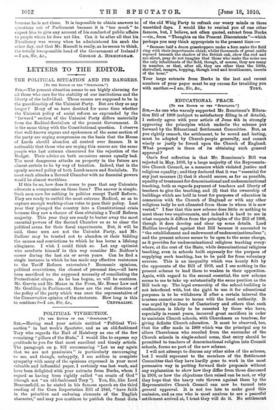LETTERS TO THE EDITOR.
THE POLITICAL SITUATION AND ITS DANGERS. [To THE EDITOR OF TIES " SPECTATOR."] SIR,—The present situation seems to me highly alarming for all those who care for the stability of our institutions and the liberty of the individual. Those causes are supposed to be in the guardianship of the Unionist Party. But are they so any longer ? ]llny of us have doubted for some time whether the Unionist policy of social reform as expounded by the "forward" section of the Unionist Party differs materially from the Radical-Socialism of the present Government. It is the same thing with the Constitutional question. I observe that well-known organs and spokesmen of the same section of the party are urging compromise on the basis that the House of Lords should abandon all control over finance. It is noticeable that those who are urging this course are the same people who last autumn clamoured for the rejection of the Budget. Their advice on both occasions seems equally bad. The most dangerous attacks on property in the future are almost certain to be by way of taxation. Indeed, that is. the openly avowed policy of both Land-taxers and Socialists. To meet such attacks a Second Chamber with no financial powers would be almost worthless.
If this be so, how does it come to pass that any Unionists advocate a compromise on these lines ? The answer is simple. Such men care for nothing in politics except Tariff Reform. They are ready to outbid the most extreme Radical, so as to capture enough working-class votes to pass their policy. Last year they plunged the country into a Constitutional crisis because they saw a chance of thus obtaining a Tariff Reform majority. This year they are ready to barter away the most essential powers of the Second Chamber so as to clear the political arena for their fiscal experiments. But, it will be said, these men are not the Unionist Party, and Mr. Balfour may be trusted not to abandon at their bidding the causes and convictions to which he has borne a lifelong allegiance. I wish I could think so. Let any optimist who comforts himself in this way consider Mr. Balfour's career during the last six or seven years. Can he find a single instance in which he has made any effective resistance to the Tariff Reform extremists ? Economic opinions, political convictions, the closest of personal ties,—all have been sacrificed to the supposed necessity of conciliating the Protectionist clique. As he has begun, so will he continue. Mr.. Garvin and Mr. Masse in the Press, Mr. Boner Law and Mr. Goulding in Parliament, these are the real directors of the policy of the party which was once the representative of the Conservative opinion of the electorate. How long is this










































 Previous page
Previous page